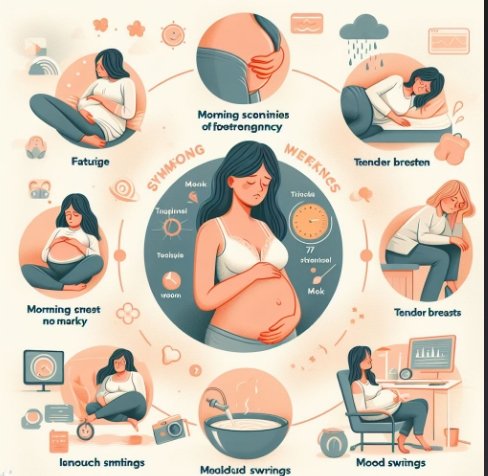Congratulations! You’re seven weeks pregnant, a pivotal time in your amazing journey. This stage marks the end of the first month and the beginning of the second trimester. It’s a whirlwind of emotions and physical changes as your body adapts to nurture your growing baby. But fear not, mama! We’re here to shed light on the most common symptoms you might experience at 7 weeks pregnant, explain your baby’s incredible development, and offer essential self-care tips to navigate this exciting phase.
Buckle Up for a Blast of Development: Your Baby at 7 Weeks
At 7 weeks, your little miracle, still technically called an embryo, is no longer just a cluster of cells. It’s now about the size of a blueberry, with a distinct head and tail end. Here’s a glimpse into the magic happening inside you:
- The Nervous System Takes Shape: Neural tube formation, the foundation for your baby’s brain and spinal cord, is well underway.
- The Heart Beats Strong: That tiny heart is pumping away, with the beginnings of chambers and valves visible.
- Facial Features Emerge: Tiny buds are forming what will become your baby’s eyes, nose, and ears. It’s a truly awe-inspiring process!
- Limb Development Begins: Arm and leg buds are starting to sprout, and tiny fingers and toes will soon follow.
- The Placenta Takes Charge: This vital organ, acting as a lifeline between you and your baby, is actively developing and exchanging nutrients.
7 Weeks Pregnant Symptoms: A Mixed Bag of Experiences
Every pregnancy is unique, and how you feel at 7 weeks can vary greatly. Some women experience a full spectrum of symptoms, while others sail through this phase with minimal discomfort. Here are some of the most common experiences:
- Morning Sickness (or All-Day Sickness): This dreaded symptom can strike anytime, not just in the morning. Nausea, vomiting, and food aversions are all part of the hormonal rollercoaster.
- Fatigue: Feeling utterly drained is par for the course. Your body is working overtime to support your growing baby, so listen to your body and rest whenever you can.
- Frequent Urination: Increased blood flow and pressure on your bladder can lead to more frequent trips to the bathroom.
- Breast Changes: Your breasts might feel tender, swollen, and tingly as they prepare for milk production.
- Bloating: Hormonal fluctuations can cause bloating and gas, making you feel tight and uncomfortable.
- Food Cravings and Aversions: Suddenly crave pickles and ice cream? Or find your favorite dish revolting? Food preferences can take a wild turn during pregnancy.
- Mood Swings: One minute you’re ecstatic, the next you’re in tears. Blame it on the hormonal surge!
- Basal Body Temperature: If you’ve been tracking your BBT, you’ll likely notice a sustained rise, indicating a healthy pregnancy.
- Light Cramping: Mild cramping is normal as your uterus grows to accommodate your baby. However, severe or persistent cramping can be a cause for concern, so consult your doctor if you experience it.
Not Every Symptom is Created Equal: When to Call Your Doctor
While some symptoms are a normal part of pregnancy, it’s crucial to know when to reach out to your healthcare provider. Here are some red flags to watch out for:
- Heavy vaginal bleeding or bright red spotting: This could be a sign of a potential miscarriage or ectopic pregnancy.
- Severe abdominal pain or cramping: This can indicate an underlying issue and requires immediate medical attention.
- Fever or chills: These can be signs of infection, which can be harmful during pregnancy.
- Vaginal discharge with a foul odor or burning sensation: This could be a sign of an infection and needs to be checked by your doctor.
7 Weeks Pregnant: Self-Care Essentials for a Smooth Journey
The first trimester can be a whirlwind, but prioritizing self-care is crucial for both you and your developing baby. Here are some essential tips to navigate this exciting phase and feel your best:
Nourish Your Body:
- Eat a balanced diet: Aim for plenty of fruits, vegetables, whole grains, and lean protein to provide your baby with the essential nutrients for growth.
- Stay hydrated: Drink plenty of water throughout the day to combat fatigue and prevent constipation.
- Listen to your cravings (within reason): Cravings can sometimes indicate your body’s need for specific nutrients. However, moderation is key.
- Don’t force foods you can’t stomach: If morning sickness makes certain foods unbearable, don’t force them. Focus on bland, easy-to-digest options that you can tolerate.
Embrace Rest and Relaxation:
- Prioritize sleep: Fatigue is a common symptom at 7 weeks. Listen to your body and get as much sleep as you need, even if it means taking naps during the day.
- Relaxation techniques: Practice calming activities like yoga, meditation, or deep breathing exercises to manage stress and promote better sleep.
Movement Matters:
- Gentle exercise: Regular physical activity can boost your energy levels, improve mood, and help you sleep better. Choose activities you enjoy, like gentle walks, prenatal yoga, or swimming.
- Listen to your limits: Don’t push yourself too hard. If you feel fatigued, take a break and resume your activity later
Support System is Key:
- Connect with your doctor: Schedule regular prenatal appointments to monitor your baby’s development and address any concerns you might have.
- Lean on your partner: Having a supportive partner by your side can make a world of difference. Share your experiences and don’t be afraid to ask for help when you need it.
- Connect with other moms: Join a pregnancy support group or online forum to connect with other women experiencing similar journeys.
Taking Care of Yourself Emotionally:
- Acknowledge your emotions: It’s normal to feel a wide range of emotions during pregnancy, from excitement and joy to anxiety and fear. Allow yourself to feel them all.
- Talk it out: Share your feelings with your partner, a trusted friend, or a therapist.
- Practice self-compassion: Be kind to yourself during this time of change.
Frequently Asked Questions About 7 Weeks Pregnant Symptoms
1. How common is morning sickness at 7 weeks pregnant?
Morning sickness, or nausea and vomiting, is a very common symptom in the first trimester, affecting up to 80% of pregnant women. It typically starts around week 6 and peaks around weeks 8-11.
2. Is it normal to not have any symptoms at 7 weeks pregnant?
Absolutely! Every pregnancy is unique, and some women experience minimal to no symptoms at all during the first trimester. This doesn’t necessarily indicate any problems. However, if you’re concerned, it’s always best to consult your doctor.
3. What can I eat to manage nausea at 7 weeks pregnant?
Opt for bland, easily digestible foods like crackers, toast, or plain rice. Ginger can also be helpful in alleviating nausea. Small, frequent meals throughout the day may be easier to tolerate than large ones.
4. How much weight should I gain at 7 weeks pregnant?
Most women don’t experience significant weight gain in the first trimester. In fact, some may even lose a few pounds due to nausea and vomiting. The focus at this stage is on eating a healthy, balanced diet to nourish your baby’s development.
5. When should I schedule my first prenatal appointment?
Ideally, you should schedule your first prenatal appointment as soon as you learn you’re pregnant. This allows your doctor to establish a baseline for your health and monitor your baby’s development from the very beginning.
Remember, every pregnancy is unique, and what works for one woman might not work for another. Listen to your body, prioritize your well-being, and don’t hesitate to seek guidance from your healthcare provider if you have any questions or concerns. This incredible journey of motherhood is about to begin, and with the right approach, you can navigate it feeling empowered and supported.



